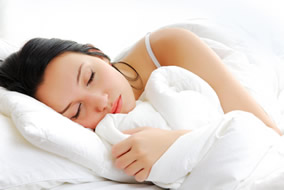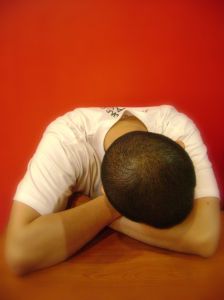By Doug Johnson
 How many hours of sleep are you getting at night? If you’re like the average American, your answer is most likely: not much. Unfortunately, a lack of sleep has been linked to a whole host of problems, but more recently it’s been linked to obesity.
How many hours of sleep are you getting at night? If you’re like the average American, your answer is most likely: not much. Unfortunately, a lack of sleep has been linked to a whole host of problems, but more recently it’s been linked to obesity.
It makes sense, right? You sleep less, therefore you’re more sluggish, less motived to exercise and more tempted to snack throughout the day. Yes, that’s the underlying link between sleep (or lack thereof) and obesity, but there’s much more to it than that.
According to the Centers for Disease Control and Prevention, nearly 70% of Americans are overweight, and at least 35% are considered obese. One of the main problems with weight gain/loss is that it’s hard to stabilize your diet and routines when, as a culture, we’re always on the go. Pulling an all-nighter, waking up when it’s still dark out and going to bed in the wee hours of the night are all things we do on a weekly basis, and it’s having a dramatic effect on our metabolisms. Unfortunately, this trend of get-up-and-go isn’t getting better, it’s getting worse. It’s now estimated that one in three children who were born in the year 2000 will develop diabetes.
You’re Hungrier When You’re Sleepy
A lack of sleep can actually make you hungrier. When your sleep cycle is disrupted, your hormones become imbalanced, and the hormone that controls your appetite, leptin, can become disrupted.
This is one of the main reasons why restrictive-type diets have such a high failure rate. People may initially see promising results, but their bodies are too inclined to living a certain lifestyle, and are actually pressuring the person to eat more—even going so far as altering how much energy they exert in order to make them crave more food. This may seem hard to believe, but it’s true.
Leptin is the hormone that regulates how much fat your body stores. It’s the hormone that determines whether you’re hungry, whether you’re full and how much energy your body expends throughout the day. One of the biggest risks of sleep deficiency is that you become more susceptible to a leptin deficiency which, you guessed it, leads to weight gain.
Other Effects of Less Sleep
 One of the most common themes we’ve seen in patients is that most aren’t sleeping enough. Sleep deprivation can alter your blood sugar levels. It can also throw off your body’s natural body heat, making you either feel warmer, colder or both. Worse still, it can aggravate your back.
One of the most common themes we’ve seen in patients is that most aren’t sleeping enough. Sleep deprivation can alter your blood sugar levels. It can also throw off your body’s natural body heat, making you either feel warmer, colder or both. Worse still, it can aggravate your back.
Muscles that are fatigued have a harder time supporting your spine, making you more likely to slouch. When you slouch you put more pressure on your spine, which in turn puts more pressure on your spine’s discs and joints. It’s a viscous cycle: back pain can lead to a lack of sleep, but a lack of sleep can also lead to back pain.
How to Curb Your Appetite
Fortunately, the effects of sleep deprivation aren’t permanent. Experts say you need about 7.5 hours of sleep a night to be awake actively throughout the day. Unfortunately, The Better Sleep Council reports 48% of Americans aren’t getting enough sleep. That said, everyone’s body is different and the amount of sleep really isn’t as important as the quality of sleep you’re getting. If you’re having trouble sleeping at night, start by taking a look at your activities throughout the day.
• Are you a coffee or tea drinker? If so, how often and when do you drink? Experts say you should limit your caffeine intake to before 2 pm—anything after could make it harder to fall asleep.
• How often do you exercise? One of the easiest ways to help you fall asleep at night is to be active enough for your body to want to rest. Sleep deprivation may cause you to be awake longer, but that doesn’t necessarily mean you’re more active. Quite the opposite, actually. So you’re up longer, eating more, and probably exercising less.
• Are you constantly on the computer before bedtime? If so, you may want to limit how long you’re online before bed. This CNN report mentions how the artificial lights on computer screens and iPads can make it harder to fall asleep.
• How cold is your bedroom? When your body is at a cooler temperature, it’s easier to fall asleep. Anyone who lives in the South can attest to this, as I’ve spent many sweltering summer nights tossing and turning.
By limiting how much caffeine you’re drinking throughout the day and exercising more, you’ll help make it easier to fall asleep at night. In addition, work toward making your nightly routine more conducive to sleep by turning off all electronics an hour before bed and turning the heat down a little. Remember, a little more sleep goes a long way in improving your health, and helping to avoid issues like obesity and back pain.
– Author Doug Johnson helped create North American Spine and manages all medical staff, in addition to training physicians in proper AccuraScope® procedure techniques.
